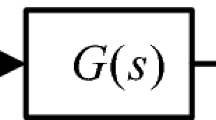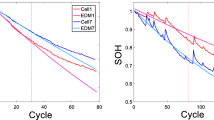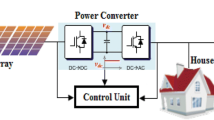Abstract
Power system operators need real-time information to reliably maintain delivery of energy to the consumers in a modern electric power network characterized by dynamically varying power flow and infrastructure availability. State estimation involves minimizing a sparse nonlinear sum-of-squares objective function. The conventional method of solution is Gauss–Newton method which is subjected to divergence issues, particularly in the presence of bad data and topology error. In this paper, numerical optimization techniques like Powell’s dog leg (PDL), indefinite Gauss–Newton Powell’s dog leg (IGNPDL) and robust incrementalized least-squares estimation are presented. IGNPDL is an incrementalized version of the PDL method which is generally used suitably in sparse least-squares minimization. These methods are robust to nonlinearity of objective function. The robustness is extendable to numerical ill-conditioning also which arises due to topology errors and bad data. Data from phasor measurement units are also used in the SE to enhance the performance. The proposed algorithm is simulated and evaluated on IEEE 14-bus and IEEE 118-bus systems. The proposed methods converge in the presence of topology errors, and the error percentage in the estimated values is considerably reduced in the presence of bad data. The simulation results bring out the effectiveness of these methods.















Similar content being viewed by others
References
A. Monticelli, Electric power system state estimation. Proc. IEEE 88, 262–282 (2000)
J. Nocedal, S. Wright, Numerical Optimization, 2nd edn. (Springer, New York, 2006)
S.K. Sikarwar, V. Kumar, R. Naresh, Power system state estimation using particle swarm optimization. J. Adv. Res. Electr. Electron. Eng. 4(3), 1–35 (2017)
P. Yang, Z. Tan, A. Wiesel, A. Nehorai, Power system state estimation using PMUS with imperfect synchronization. IEEE Trans. Power Syst. 28, 4162–4172 (2013)
A. Simoes-Costa, V.H. Quintana, A robust numerical technique for power system state estimation. IEEE Trans. Power Appl. Syst. PAS-100, 691–698 (1981)
V. Seshadri Sravan Kumar, D. Thukaram, State estimation in power systems using linear model infinity norm-based trust region approach. IET Gener. Transm. Distrib. 7(5), 500–510 (2013)
M. Zhou, V. Centeno, J. Thorp, A. Phadke, An alternative for including phasor measurements in state estimators. IEEE Trans. Power Syst. 21, 1930–1937 (2006)
S. Chakrabarti, E. Kyriakides, G. Ledwich, A. Ghosh, Inclusion of PMU current phasor measurements in a power system state estimator. IET Gener Trans. Dist. 4, 1104–1115 (2010)
A.R. Conn, N.I.M. Gould, P.L. Toint, Trust region methods. Society for Industrial and Applied Mathematics and Mathematics Programming Society (2000).
S. Pajic, K.A. Clements, Power system state estimation via globally convergent methods. IEEE Trans. Power Syst. 20, 1683–1689 (2005)
M. Powell, On the global convergence of trust region algorithms for unconstrained minimization. Math. Program. 29(3), 297–303 (1984)
G. Shultz, R. Schnabel, R. Byrd, A family of trust-region-based algorithms for unconstrained minimization with strong global convergence properties. SIAM J. Numer. Anal. 22(1), 47–67 (1985)
D.M. Rosen, M. Kaess, J.J. Leonard, RISE: an incremental trust region method for robust online sparse least-squares estimation. IEEE Trans. Robot. 30(5), 1091–1108 (2014)
R.F. Nuqui, A.G. Phadke, Hybrid linear state estimation utilizing synchronized phasor measurements. IEEE Lausanne Power Technol. 56, 1665–1669 (2007)
K. Jamuna, K.S. Swarup, Two stage state Estimator with phasor measurements, in 2009 International Conference on Power System, pp. 1–5 (2009).
L.T. Valeriu Presad, M. Eremia, Modified state estimation in presence of PMU measurements, in 2014 U.P.B. Sci. Bull., Series C, vol. 76 (2014).
J.S. Thorp, A.G. Phadke, K.J. Karimi, Real-time voltage-phasor measurements for static state estimation. IEEE Power Eng. Rev. PER-5, 32–33 (1985)
A. A. Antonio Gomez-Exposito, On the use of PMU in power system state estimation, in 17th Power system computation conference, Sweden (2011).
G. Korres, An integer-arithmetic algorithm for observability analysis of systems with Scada and PMU measurements. Electr. Power Syst. Res. 81, 1388–1402 (2011)
A. Jovicic, M. Jereminov, L. Pileggi, G. Hug, A linear formulation for power system state estimation including RTU and PMU measurements, in IEEE PES ISGT Conference Europe (2019).
M.R. Wagner, M. Jereminov, A. Pandey, L. Pileggi, A probabilistic approach to power system state estimation using a linear algorithm, in Proceedings of 19th IEEE International Conference on Environment and Electrical Engineering, Italy (2019).
T. Jin, X. Shen, A mixed WLS power system state estimation method integrating a wide-area measurement system and SCADA technology. Energies J. (2018).
N.P. Theodorakatos, Optimal phasor measurement unit placement for numerical observability using branch-and-bound and a binary-coded genetic algorithm. Electr. Power Comp. Syst. 47, 4–5 (2019)
L. Zhang, G. Wang, G.B. Giannaki, Real-time power system state estimation and forecasting via deep unrolled neural networks. IEEE Trans. Signal Process. 67(15), 5–60 (2019)
L. Wang, Q. Zhou, S. Jin, Physics-guided deep learning for power system state estimation. J. Mod. Power Syst. 8(4), 56–80 (2020)
Funding
No funding.
Author information
Authors and Affiliations
Corresponding author
Ethics declarations
Conflict of interest
The authors declare that there is no conflict of interest.
Additional information
Publisher's Note
Springer Nature remains neutral with regard to jurisdictional claims in published maps and institutional affiliations.
Rights and permissions
About this article
Cite this article
Bindu, S., Ushakumari, S. & Savier, J.S. Robust Incrementalized Least-Squares Estimation Method in State Estimation with Phasor Measurement Unit Measurements. J. Inst. Eng. India Ser. B 103, 1315–1325 (2022). https://doi.org/10.1007/s40031-021-00707-1
Received:
Accepted:
Published:
Issue Date:
DOI: https://doi.org/10.1007/s40031-021-00707-1




